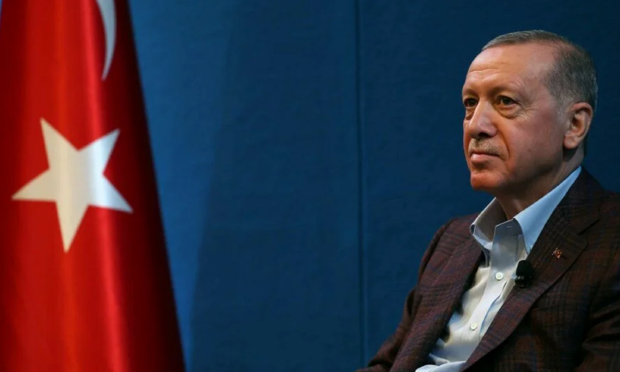Ankara seems to be turning to a policy of equal distances in its diplomatic rhetoric towards the West and Russia, with the Turkish president also lowering his tone on the break with the European Declaration he declared yesterday.
Turkish President Recep Tayyip Erdogan said he trusts Russia as much as he trusts the West. Explaining his recent meeting with Russian President Vladimir Putin, Erdogan said he failed to persuade him to resume the Black Sea grain deal, from which the Kremlin withdrew in July, but obtained a promise that Russia would supply 1 million tonnes of grain to Africa.
"I have no reason not to trust them," Erdogan said during an interview late Monday with the U.S. PBS television network in New York, where he is attending the U.N. General Assembly. "To the extent that the West is credible, Russia is equally credible. For the last 50 years, we have been waiting on the doorstep of the EU and, at this moment, I trust Russia as much as the West."
Ankara maintained close ties with both Russia and Ukraine during the 19-month war. In July last year, Turkey and the UN were able to reach an agreement that allowed Ukrainian grain to be safely transported from its ports to the Black Sea, helping to alleviate the global food crisis.
Moscow withdrew from the deal two months ago, claiming that a parallel agreement allowing its food and fertiliser exports had not been respected.
Erdogan is visiting New York four months after winning an election that extended his 20-year rule for another five years. His new term has seen signs of improvement in Ankara's often fragile relationship with the West.
Speaking at an event on Monday, the Turkish leader appeared to retract comments he made just before leaving for New York in which he suggested Turkey could end its 24-year quest for European Union membership. "We see that a window of opportunity has opened to revitalize Turkey-EU relations at a critical time," Erdogan said, according to a transcript of the meeting published by his office. "We continue to stress the importance of revitalizing Turkey's EU accession process."
Erdogan also pointed to improving ties with Washington, which have recently focused on Ankara's approval of Sweden's NATO membership application and a possible deal to supply F-16 fighter jets to Turkey. "We are satisfied with the development of our cooperation with the US," Erdogan said. "We resolved most of the deadlocks during the talks with Mr. Biden and decided to hold more talks in line with the positive agenda."
Turkey and Hungary are the only NATO members that did not approve Sweden's application to join the defence alliance, which Stockholm made after Russia invaded Ukraine. The issue is due to be debated by the Turkish parliament when it returns from its holiday next month.
Some members of the U.S. Congress have pointed out that the supply of F-16s to upgrade Turkey's fighter fleet is contingent on Ankara's agreement to Sweden's NATO membership. But Erdogan reiterated that "these two issues should not be linked" although he said the decision on Sweden belongs to the Turkish parliament, where his party and its allies have a majority. "If the parliament does not take a positive decision on this nomination, then there is nothing we can do," he told PBS.
Erdogan also drew a line between Sweden's NATO candidacy and Turkey's EU membership. In July, however, he called on EU member states to "clear the way for Turkey" in exchange for Sweden's path to NATO. On Monday, he told PBS that "Sweden's position and our current position in the EU accession negotiations are two different things."
Referring to the war in Ukraine and his contacts with Putin, Erdogan said it was "quite obvious that this war will last a long time," but that the Russian leader was on the side of ending this war as soon as possible. "That's what he said. And I believe his remarks," Erdogan said.



